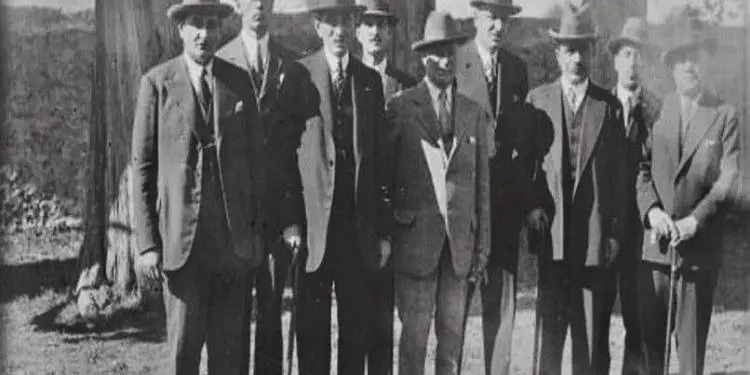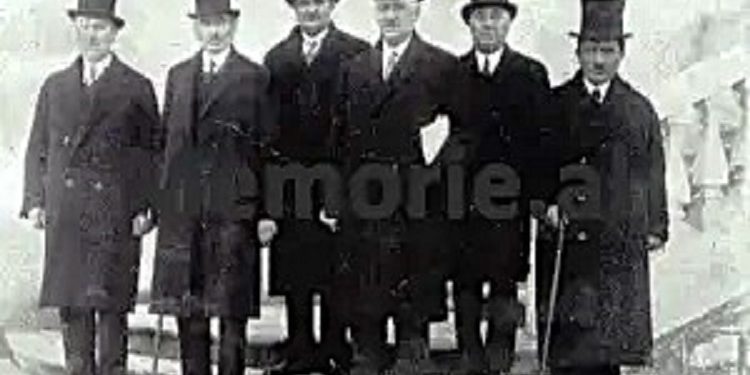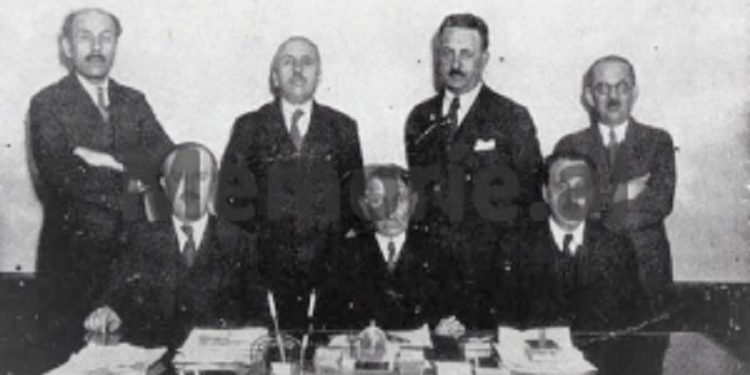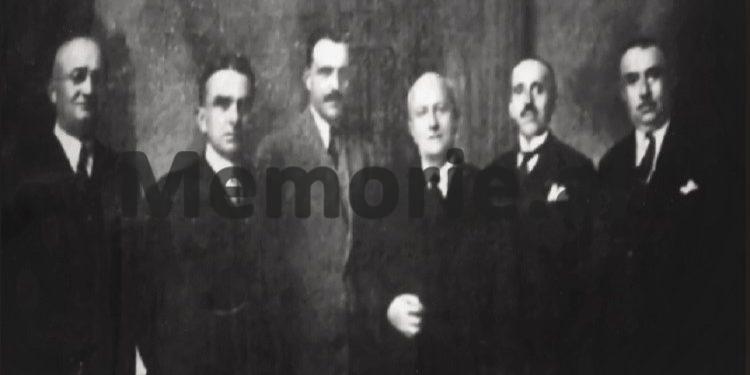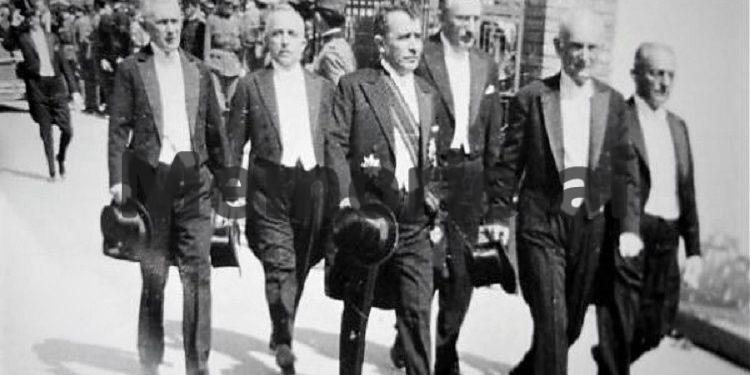Part Two
Memorie.al / “During Zog’s time, it was more difficult to become a diplomat than it is today.” Uran Asllani, a scholar of Albanian diplomacy from 1914-1944 and the son of one of the most prominent Albanian diplomats of the 1930s, explains that a diplomat in that period had to pass through several “sieves” to be appointed to this position. In an exclusive interview, he recounts all the criteria that a person aspiring to become a diplomat had to meet. He also reveals the origins of Albanian diplomacy, which countries we established diplomatic relations with, and what their mission was.
Who are the most important figures in Albanian diplomacy of that era? In this article, we are also publishing the list of the names of diplomats from 1914-1944, and in the next issue; we will publish the list of all diplomats from 1944 to 2007.
Continued from the previous issue
Mr. Asllani, what role did Albanian diplomats play in the international arena during that period?
It was June 1933. The representative of Albania at this conference should have been the Minister of Finance, but Zog appointed my father, (Fuat Asllani), since he was an Englishman. He also appointed the honorary consul in Vienna, who was in London, as a member of the delegation. The conference took place, and on one of the days of the conference, as was customary, the delegations were hosted for dinner by large corporations in honor of hospitality. At one of those dinners, my father and about 27 other delegations were invited to the steel corporation.
However, the steel corporation was a corporation that did not know diplomatic rules, protocol, and ceremonies. In diplomatic protocol, the official with the highest diplomatic rank, the ambassador, is placed in the place of honor. At that time, only the former empires had embassies. The others had Ministers Plenipotentiary. After the ambassador, the Minister Plenipotentiary of the first class is placed, but of the most important state.
They did not know this, but in the alphabetical order, it was “Albania,” so they placed my father next to the corporation’s president. The president stood up and gave a quarter-hour welcoming speech, with the archaic jargon of the English, “honored,” “much honored,” etc. Now one of the delegations had to return the greeting. My father was right next to the president.
At the back of the hall was an enemy of Albania, and consequently, someone my father disliked, the Italian Minister of Finance, Dino Grandi, Mussolini’s right-hand man, who later executed him. At that time, he was both the Minister of Finance and the Deputy Minister of Foreign Affairs. He said to my father: “Get up and give the answer,” not knowing that my father knew English perfectly. My father stood up and gave a speech using the same jargon that the corporation’s president used. The next day, 12 London newspapers mentioned Albania for the speech.
How many Ministers Plenipotentiary did Albania have until 1939?
Until 1937, there were 8 Ministers Plenipotentiary of the first class and 3 Ministers Plenipotentiary of the second class, and these were: Mehmet Konica, Dhimitër Berati, Xhaferr Vila, Mehdi Frashëri, Fuad Asllani, Raul Fico, Lekë Kurti, Dhimitër Popa. Although he was a Minister Plenipotentiary of the first class, at that time he was not in the Ministry of Foreign Affairs, but was the Court Minister.
We had permanent legations with Ministers Plenipotentiary of full class rank in Washington, London, Paris, Rome, Berlin, Bucharest, Tokyo, Belgrade, Athens, Ankara, Sofia. Then we had consulates general of very important rank, which were in three cities in Germany: in Nuremberg, Hamburg, and Stuttgart. We had a consulate general in Marseille, Brussels, Thessaloniki, Istanbul, Milan, Bari, and many consulates. In Italy: Turin, Bologna, Brindisi, Trieste, Bitola, Ioannina, Constanța, Budapest, New York, etc.
Who were the most prominent figures in this field during those years?
We must start with Raul Fico, who honored himself and Albania. The assessment of foreign diplomats for him was also first class. Secondly, there was Xhaferr Vila, whose anti-Italian stance even caused the accident that led to his death. He was Minister Plenipotentiary in Rome, having conflicted several times with the Italian Ministers Plenipotentiary here in Albania.
Another important diplomat of that time was Dhimitër Berati. Perhaps my father, (Fuat Asllani), as well, because the importance is also in which states you are appointed. Also Eqerem Libohova, Xhemil Dino, etc. These were the most powerful representatives of diplomacy for almost 20 years. But there are many diplomats of a lower rank who served Albanian diplomacy with devotion.
LIST OF 80 ALBANIAN DIPLOMATS, FROM 1912 TO 1944
- Jani Armodhi, consul in Egypt, in 1922
- Ali Asllani, consul in Italy, in the years 1922-1925; ambassador in Bulgaria, in the years 1925-1926 and ambassador in Greece, from 1930 to 1932
- Fuad Asllani, ambassador in England, in the years 1934-1935
- Reshad Asllani, consul in Italy, in the years 1923-1924; consul in Bitola, in the years 1938-1939
- Rexha Bega, consul in Turkey, in 1938
- Xhaferr Belegu, consul general in Bari, consul in Italy in the years 1938-1939
- Dhimitër Berati, consul general in Bulgaria, in 1924; ambassador in France in the years 1924-1925
- Haki Blloshmi, consul in Boston, USA, from 1925 to 1929
- Selaudin Blloshmi, ambassador in Romania, in the years 1926-1928
- Kostandin Boshnjaku, ambassador in Turkey, in 1922
- Kostandin Çekrezi, ambassador in the USA, in the years 1921-1922
- Remzi Çelo, consul in Thessaloniki, Greece 1934-1939
- Lazër Çeta, consul in Yugoslavia, in 1925
- Sofokli Çomora, consul in Corfu, Greece, in the years 1928-1933
- Ferid Dervishi, consul general in Bari, Italy, in the years 1925-1926; consul in Thessaloniki, Greece, in the years 1932-1933; consul general, in Turkey 1934-1936
- Xhemil Dino, ambassador in Italy, from 1926 to 1931, and ambassador in England, in the years 1932-1933
- Vasil Dogani, consul general in Romania in the years 1922-1936
- Asdreni, consul in Romania in the years 1921-1926
- Dervish Duma, consul in London, England, in the years 1936-1939
- Rauf Fico, ambassador in Turkey, in the years 1926-1928; ambassador in Yugoslavia, in the years 1928-1929 and 1932-1937, ambassador in Greece in the years 1937-1938; ambassador in Germany, in the years 1938-1939
- Mehdi Frashëri, ambassador to the UN, in the years 1926-1929
- Mit’hat Frashëri, ambassador in France, in the years 1922-1923; Greece in the years 1923-1926
- Qemal Frashëri, consul in Corfu, Greece, in the years 1925-1926
- Xhemal Frashëri, consul in London, in the years 1925-1927; consul general in Bitola in the years 1935-1938; consul general in Istanbul, Turkey, 1938-1939
- Shemzi Gabrani, consul in Bari, Italy, in 1925,
- Gjergj Geco, consul general in Egypt, in the years 1934-1935; consul general in Ioannina, Greece, in the years 1935-1936
- Rrok Gera, ambassador in Germany, in 1944
- Fahredin Gjata, ambassador in Greece, in the years 1926-1927
- Shaqir Hajrullahu, consul in Istanbul, Turkey, 1936-1938
- Sabri Hamzaj, consul in Istanbul, Turkey, in 1926
- Maksud Hulusi, consul general in Ioannina Greece, in the years 1937-1939
- Remzi Janina, consul general in Ioannina, Greece, in the years 1926-1931
- Qemal Jusfuti, consul general in Thessaloniki, Greece in the years 1934-1935
- Angjelin Kakarriqi, consul in Corfu Greece, in the years 1938-1939
- Vasil Kalluci, consul in Corfu, Greece, in 1926
- Hamdi Karazi, consul in Italy, in the years 1927-1928, consul general in Corfu Greece in the years 1933-1934
- Nikollë Kasneci, consul in Italy, in the years 1920-1921
- Ndrio Katundi, consul in Yugoslavia, in the years 1922-1924
- Stavri Katundi, consul in Bitola, in the years 1938-1939
- Atlante Koçi, consul in Bulgaria, in the years 1936-1939
- Mark Kodheli, consul general in Bari, consul in Italy, in the years 1927-1933
- Xhahid Koka, consul general in Thessaloniki, Greece in 1938
- Faik Konica, ambassador in the USA, in the years 1926-1939
- Mehmed Konica, ambassador in England, in the years 1920-1925
- Skënder Konica, consul in Bulgaria, in the years 1932-1934
- Stelio Kostandini, consul in Egypt, in the years 1923-1925
- Dhimitër Kosturi, consul in France, in the years 1928-1932; consul in Ioannina, Greece, in the years 1932-1935; consul general in Egypt, in 1935
- Kostandin Kote, consul in Italy, in the years 1922-1923
- Ceno Kryeziu, ambassador in Yugoslavia, in the years 1926-1927, ambassador in Czechoslovakia, in the years 1927-1934
- Lec Kurti, consul in Bari, Italy in the years 1921-1922; ambassador in Greece, from 1925-1926; ambassador to the UN, in the years 1930-1935
- Sotir Laci, consul in Greece, in the years 1936-1937
- Nezir Leskoviku, consul in Istanbul, 1922-1925; consul general in Bulgaria, in the years 1932-1933; consul in Greece in the years 1936-1938
- Xhavid Leskoviku, ambassador in Yugoslavia, in the years 1925-1926; ambassador in Turkey in the years 1933-1934, ambassador in Greece in the years 1934-1936
- Asaf Libohova, consul in Bari, Italy, in 1939
- Eqerem Libohova, ambassador in Italy, in the years 1925-1927, ambassador in France in the years 1933-1936
- Maliq Libohova, consul in London, consul in England, in the years 1926-1927; consul general in Bari, Italy, in 1939
- Tefik Mborja, ambassador in Italy, in the years 1923-1925
- Kosta Meksi, consul in Bitola, in the years 1933-1934; consul general in Istanbul, Turkey in 1937
- Qemal Mesarea, ambassador in Greece, in the years 1933-1934
- Kostandin Mima, consul in Trieste, Italy, in the years 1925-1927
- Gjergj Naçi, consul in Turkey, in 1937
- Pandeli Nase, consul general in Egypt, in the years 1927-1934
- Fan Noli, ambassador to the UN, in the years 1921-1922
- Gjergj Pekmezi, consul in Austria, in the years 1921-1925; consul in Yugoslavia, in the years 1925-1926
- Nik Pema, consul in Hungary, in the years 1923-1925
- Dhimitër Popa, ambassador in Bulgaria, in the years 1932-1934
- Nikollë Rrota, consul general in Austria, in the years 1921-1926
- Çatin Saraçi, consul general in Bari, Italy, in 1925; consul in Austria, in the years 1926-1929
- Xhemal Sojli, consul in Constanța, Romania, in the years 1921-1923
- Rrok Stani, consul in Romania, in the years 1926-1927; consul general in Corfu, Greece, in the years 1937-1939
- Stavro Stavri, ambassador in Yugoslavia, in 1925; ambassador in Greece, in the years 1926-1928
- Avdyl Sula, consul in New York, USA in the years 1923-1925; consul general in Thessaloniki, Greece, in the years 1926-1927; ambassador in Egypt, in the years 1938-1939
- Xhelal Shaska, consul in Bari, Italy, in 1938
- Tahir Shtylla, ambassador in Yugoslavia, in the years 1927-1929
- Koço Tashko, consul in New York, USA, in the years 1922-1924
- Xhaferr Vila, consul in France and England simultaneously, in 1925; ambassador in Yugoslavia in the years 1929-1932, ambassador in Greece, in the years 1932-1933, ambassador in Italy in the year 1936-1938
- Eqerem Vlora, ambassador in England, in the years 1927-1929, ambassador in Greece, in 1929
- Iljaz Vrioni, ambassador in France, in the years 1925-1927
- Asaf Xhaxhuli, consul general in Skopje, in the years 1933-1936; ambassador in Turkey, in the years 1938-1939
- Zaharia Zamifresku, honorary consul in Romania, in the years 1921-1929 / Memorie.al




